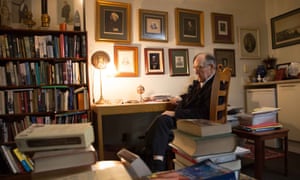Party stalwart was most famous for his work for Gough Whitlam and Bob Hawke
Graham Freudenberg, a speechwriter for the Labor prime ministers Gough Whitlam and Bob Hawke, has died aged 85.
Freudenberg, a central figure in the Labor party for more than 40 years, was already unwell in 2018 when he was the subject of the documentary The Scribe, which detailed his pioneering role as the doyen of Australian political speechwriters.
He principally wrote for the federal Labor leaders Arthur Calwell, Whitlam and Hawke and the New South Wales Labor premiers Neville Wran, Barrie Unsworth and Bob Carr.
The former prime minister Paul Keating paid tribute to Freudenberg, describing him as a “literary prince” whose death ended “a lifetime of fidelity to the precepts of the Labor party and every uplifting thing he understood it to be about”.
“He was a master writer, able to distil complexity into phrases and sentences that were as powerful as they were simple, and more often than not, replete with a beauty that made them compelling,” Keating said in a statement.
Labor leader Anthony Albanese said that “one of our greatest voices has fallen silent” describing Freudenberg as “the man who reached deep into the Australian Labor Party and found the words within its heart”.
“As Freudy put it, the Labor Party was built on speeches. For the rest of us in the Labor family, there was never any question as to who the master builder was.”
“Graham’s words gave Australia a better understanding of itself, of its democracy and its politics. His words elevated. They gave clarity and, vitally, they gave heart.”
Born in 1934, Freudenberg trained as a journalist and began to write for Calwell before the 1961 election.
He is most famous for his work for Whitlam, including the “It’s time” speech delivered as Whitlam led Labor out of a 23-year stretch in opposition in 1972.
Freudenberg was appointed a member of the Order of Australia in 1990
and inducted as a lifetime member of the Labor party in 2005.Freudenberg, a central figure in the Labor party for more than 40 years, was already unwell in 2018 when he was the subject of the documentary The Scribe, which detailed his pioneering role as the doyen of Australian political speechwriters.
He principally wrote for the federal Labor leaders Arthur Calwell, Whitlam and Hawke and the New South Wales Labor premiers Neville Wran, Barrie Unsworth and Bob Carr.
The former prime minister Paul Keating paid tribute to Freudenberg, describing him as a “literary prince” whose death ended “a lifetime of fidelity to the precepts of the Labor party and every uplifting thing he understood it to be about”.
“He was a master writer, able to distil complexity into phrases and sentences that were as powerful as they were simple, and more often than not, replete with a beauty that made them compelling,” Keating said in a statement.
Labor leader Anthony Albanese said that “one of our greatest voices has fallen silent” describing Freudenberg as “the man who reached deep into the Australian Labor Party and found the words within its heart”.
“As Freudy put it, the Labor Party was built on speeches. For the rest of us in the Labor family, there was never any question as to who the master builder was.”
“Graham’s words gave Australia a better understanding of itself, of its democracy and its politics. His words elevated. They gave clarity and, vitally, they gave heart.”
Born in 1934, Freudenberg trained as a journalist and began to write for Calwell before the 1961 election.
He is most famous for his work for Whitlam, including the “It’s time” speech delivered as Whitlam led Labor out of a 23-year stretch in opposition in 1972.
In The Scribe, Carr said what distinguished a Freudenberg speech was that “he elevates its sentiments, and the romance of its history – he has got a matchless sense of rhythm in his speechwriting, which is just unrivalled”. “The conclusions of his speeches can be galvanising.”
Out of more than 1,000 speeches he wrote Freudenberg nominated the “the Drum Beat speech” for Calwell in May 1964 as his best “because its great purpose was not to analyse the war in Vietnam, but to say that the Americans would be humiliated”.
“To say that in 1965 was to invite ridicule but it was right.
“A great speech requires a great issue and that is why my Vietnam speeches were undoubtedly the best I wrote because the issue was so important.”

No comments:
Post a Comment